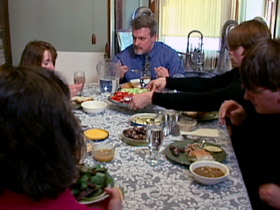In This Episode << SLIDE LEFT TO SEE ADDITIONAL SEGMENTS
Orthodox Lenten Meals
BOB ABERNETHY, host: For Eastern Orthodox Christians this is Great Lent, the 40-day period of strict fasting leading up to Easter. The Orthodox are supposed to observe fasts of one kind or another nearly all year; no meat on some days, no dairy or oil on others. Their calendars serve as reminders. The discipline of fasting is supposed to help focus the mind on God and bring the person fasting closer to God. Catherine Mandell of Clearfield, Pennsylvania talked with us about her family’s fasts.
 CATHERINE MANDELL: The church generally gives us a calendar to help us track those days that we are to fast and which days we’re allowed not to fast. We have several others fasting periods during the year. If you take all those days together you are fasting for more than half the year.
CATHERINE MANDELL: The church generally gives us a calendar to help us track those days that we are to fast and which days we’re allowed not to fast. We have several others fasting periods during the year. If you take all those days together you are fasting for more than half the year.
The fasts vary in strictness. Great Lent is obviously the most strict of the fasts because it is the biggest feast that we’re preparing for—for Easter. We fast Wednesdays and Fridays during the regular parts of the year. We don’t eat meat. We don’t eat dairy products. We don’t eat eggs. We don’t eat fish, anything animal-related. We don’t cook with oil at all on the days that we fast from oil. We tend to abstain from alcoholic beverages and wine.
If you are an able-bodied person and you are healthy, there’s no reason why you shouldn’t be able to fast. That being said, if you are aged or infirm, if you have some kind of illness, then you need to make adjustments in your diet.
Wild Rice SaladFrom “When You Fast: Recipes for Lenten Seasons” by Catherine Mandell (St Vladimir’s Seminary Press, 2006) Prepare the wild rice mix, omitting the margarine, as directed on the package. Cook until the rice is tender and there is still some liquid left in the bottom of the pan, about 20 minutes. Variations· On an oil day, add 2 to 3 tablespoons olive oil. From “When You Fast: Recipes for Lenten Seasons” by Catherine Mandell (St Vladimir’s Seminary Press, 2006) |
I was born Orthodox. I don’t have any memories of not fasting from meat. We didn’t fast from dairy products or fish. When my husband and I were married, we decided that we wanted to be a little more strict, that we wanted to follow the church’s teaching that we would fast from meat and dairy and oil, so my children have no recollection of not fasting, ever.
It was very difficult at first. We ate a lot of spaghetti and tomato sauce, and we ate a lot of split pea soup, because basically those were the things I knew that I could make that tasted good, to make it more interesting. I pulled from different cultural and ethnic types of foods—Indian curries, Asian stir fries, or Middle-Eastern cuisines—to try to make food that was more tasty, more diverse, so that you’re not eating the same thing day after day and getting so frustrated and so bored with fasting foods.
ZACH MANDELL: It’s amazing when you have the resources. I mean you could make something different every day, and you wouldn’t get bored with anything. At school it’s a little trying, but I make do as best as I can.
CATHERINE MANDELL: You get so many questions about fasting when you’re an Orthodox Christian because we’re so strict with our fasting in comparison to the other churches. Fasting is not about deprivation. It’s not about suffering. It’s something that you make a choice to do that you’re supposed to do in freedom and joy so that you can get ready for the resurrection of Christ. You do it for yourself, you know, and the Bible even says fast in secret, and if for some reason you break the fast because you’ve gone somewhere and you’ve been served something, instead of proclaiming yourself as fasting you humbly eat what is served to you. Then you fast twice as hard in secret.
During Lent we don’t only want to fast from food. You fast with your mouth and your ears. You hold council with your tongue, so that you’re fasting from gossip and slander. You don’t have sex during Great Lent because you’re abstaining from the passions of the flesh. You do more acts of charity, and you spend more time in prayer. You spend more time in reading the Scripture. because that’s what makes the fast. It’s not just what you eat. It’s how much you’re eating. It’s a concept called “right eating,” eating the right foods at the right times in the right amounts for the right reason, how to correct yourself and what you need to do to get to the celebration of the resurrection, because ultimately you’re working toward getting into the kingdom of heaven.

